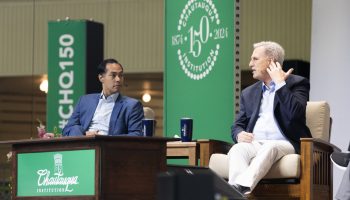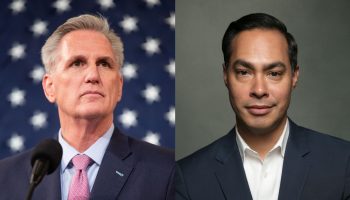Welcome to the fourth week of our 144th Assembly. If this is your first week at Chautauqua, we are delighted that you are joining us on these sacred grounds and in this historic grove. If this week marks a continuation of your Chautauqua journey, we are fortunate to share another week of the Chautauqua experience with you.
This is also a very special week for me personally, as it links my previous journey and work at Youth For Understanding USA (YFU) with my abiding love for Chautauqua in a powerful week on “Geopolitics Today” and our interfaith exploration on “Religion and Statecraft Today: The Soft Power of Global Peacemaking.”
I was interviewed on Thursday by a Chautauquan Daily staff writer about the topic and substance of a conversation I will be having with YFU’s board chair Daryl Weinert in the Hall of Philosophy on Friday of this week, titled “The Soft Power of Global Peacemaking, One Young Person at a Time.” The Daily reporter asked me why I thought “soft power” was necessary in the grander scheme of geopolitics. I shared with her that I don’t believe that a true and lasting peace, anywhere, can be maintained unless global citizens buy in at the grassroots level. That’s certainly what YFU is trying to do: create global citizens with a deep intercultural understanding, a sense of mutual respect for others and a profound commitment to social responsibility.
That sounds a lot like the conversation we’ve been having at Chautauqua this season. How do we find ways to come together in our exploration of the best in human values with the unrelenting goal of creating a better world?
Rabbi Edwin Friedman said in his work titled Leadership in the Age of the Quick Fix, “People can only hear you if they are moving toward you.” In the cases of YFU and Chautauqua, that’s precisely what we’re trying to do: help empower citizens with the tools of active, empathetic listening; with a mandate to lean into difference; to seek first to “understand than to be understood.” I’m excited to share this part of my personal journey with Chautauquans, to welcome my dear friend Daryl and his family, with whom I traveled to Cuba on a people-to-people mission trip, and to welcome our friends from the Center for Strategic and International Studies to the grounds to join in the conversation.
I recognize that not all Chautauquans can be with us every week of the season. For those who missed the opening Three Taps of the Gavel, I asked if we could commit to a new muscular civic dialogue this season and beyond. If you missed that talk, you can find it at chq.org/threetaps2017.
Last week as we explored “A Crisis of Faith?,” I could see Chautauquans wrestling with issues and ideas, many of which were counter to their own belief systems, but engaging with an eye toward trying to understand. Our speakers and participants shared with me how refreshing it was to have meaningful dialogue on ideas and difference without the hostility and anger we often find beyond these gates. Chautauquans shared that they felt uplifted and enriched by powerful ideas that spanned the spectrum of ideologies from people of many faiths or “none.” This was our first real test of living into that challenge, and, by all accounts, we as a community passed with flying colors. For me, this is the best of Chautauqua, and it’s the best of what we might offer our global society. I’m excited to see how we tackle complex issues of economics, energy, climate change and international security in the age of terrorism, and, furthermore, how we might explore the answers that lie in different traditions for conflict transformation, understanding and collaboration.
We often say that there is no place like Chautauqua. Let’s continue to work to be a witness to what happens when a community truly lives “the best in human values.”




